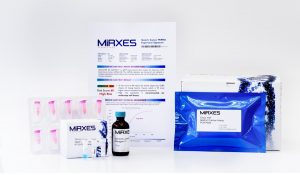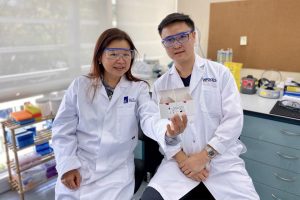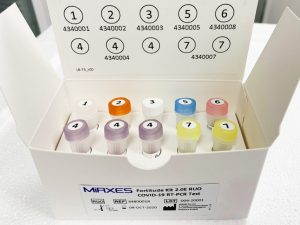Last month, the Ministry of Health announced that over 281,000 COVID-19 tests—that’s 49,000 tests per million people—have been conducted in Singapore to detect cases and contain the spread of the virus.
This is among the highest testing rates in the world, but Singapore wants to further ramp up their COVID-19 testing capacity to up to 40,000 a day by later this year. This also means that we would need at least 280,000 test kits a week.
Helping Singapore to flatten the curve is MiRXES, a homegrown biotechnology company co-founded by Dr. Zhou Lihan in 2014.
Prior to manufacturing COVID-19 test kits, MiRXES specialises in the world’s first microRNA-based blood test for early detection of gastric cancer.
When COVID-19 hit Singapore and test kits were highly sought after, they quickly switched their manufacturing lines to help meet the demand for coronavirus testing.
We found out from Dr Zhou how he started MiRXES and adapted the business to help Singapore in the battle against COVID-19.
How a team of scientists became entrepreneurs
After completing his undergraduate studies, 37-year-old Dr Zhou continued to do his PhD at the National University of Singapore (NUS) where he graduated with 16 publications and two patent applications.
While studying for his PhD there, he met associate professor Too Heng-Phon, who was his teacher, and fellow PhD student Dr Zou Ruiyang.
Together, the trio wanted to created to create a technology platform that could reliably and sensitively detect microRNAs.

MicroRNAs, one of the smallest pieces of genetic material, play an important role in regulating gene expression and many bodily functions, and are promising markers for identifying the early-stage risk of diseases such as cancer.
They then worked together to develop the technology in an NUS laboratory.
However, they knew that they needed more than just good research to develop accurate blood tests that can detect cancer and save lives through early diagnosis.
In 2014, when the opportunity arose, they worked at A*STAR to incubate the technology and conceptualized their own company called MiRXES—a spin-off from A*STAR—to commercialize and apply the technology platform.
Read this: The Techsauce Global Summit is debating the future after COVID-19
With the platform, they can study and develop diagnostic applications for more than 30 different diseases, including more than 10 different cancer types, heart disease, and diabetes.
The scientist-entrepreneur was so passionate about developing early detection tests for cancer that he was recognized by MIT Technology Review as a member of the “Innovators under 35” in 2015.
Specializing in early cancer detection kits
“In collaboration with the Singapore Gastric Cancer Consortium and DxD Hub, we developed a serum microRNA assay for early detection of gastric cancer and were beginning large-scale clinical studies to bring the assay (GASTROClear) from bench to bedside,” said Dr Zhou.
The test was subsequently approved by the Health Sciences Authority (HSA) of Singapore in May 2019 for clinical use.
With GASTROClear, MIRXES was the only Asian company featured in the prestigious Nature Biotechnology on Cancer Liquid Biopsy, alongside other big players.
Being the first-in-world is a remarkable milestone for a young startup and it kicked off their entry into the diagnostics market with a “Made in Singapore” innovation.

Dr Zhou was quick to give credit to his co-founders and his 40-plus strong Singapore team at MiRXES.
The team had grown almost tenfold since they started in 2014. They even opened a new office at Biopolis in January this year to accommodate their expanding R&D team.
They have also expanded overseas, with offices in US, China, and Japan, in addition to collaborating with health organisations and bodies in these countries.
They are also working with pharmaceutical giants Johnson & Johnson and Janssen Pharmaceutical to develop breakthroughs in scientific research and diagnostic development in cancer.
How they switched to manufacturing COVID-19 test kits
Shortly after they ushered in their new office at Biopolis, Singapore confirmed its first case of COVID-19 within the same month.
The government responded to the outbreak by steadily building up the national capacity to conduct tests for COVID-19.
By February, the outbreak was worsening and Singapore saw an increasing number of infected cases, which surged exponentially with confirmed cases from migrant worker dormitories.
Diagnostic test kits to detect the virus were in high demand and they needed to be produced fast.
Additionally, test kits were scarce amid surging global demand so it was not an option to source from other countries.
Singapore then had to lean on local companies to help fill the shortfall. Establishing a local manufacturing base here in Singapore enabled it to have full control over product quality and supply.
Researchers from A*STAR and Tan Tock Seng Hospital (TTSH) quickly started working together to develop a diagnostic test kit within three weeks and received approval from the HSA.
Named the Fortitude test kit, it uses the reverse transcriptase polymerase chain reaction (RT-PCR) method to directly detect the pathogen that causes the COVID-19 virus.
With that, MiRXES investor and director Isaac Ho has lauded the RT-PCR tests as the “gold standard”.
The pilot production of the test kits was headed by the Diagnostics Development (DxD) Hub, which also supported the verification of the tests.
In early February, the first batches of the Fortitude Kit were deployed.

DxD Hub then decided to pass the baton to MiRXES, who has been a leading player in diagnostic development and has outstanding manufacturing capabilities since 2014.
Over the past five years, MiRXES has been working with DxD Hub in developing different tests like the gastric cancer screening tests approved in May 2019.
Therefore, they already have a working relationship and trust built over the years. MiRXES saw this as a great opportunity and quickly took it on.
In mid-February, A*STAR’s commercialization arm, A*ccelerate, which leads the DxD Hub initiative, licensed to MiRXES the rights to manufacture and commercialize the test kit.
With MiRXES handling the bulk of the manufacturing, DxD Hub will be able to focus on developing new tools required as the outbreak progresses.
While DxD Hub is capable of translating research output into products, it does not necessarily have the capability to take the products to market. This is where local small and mid-sized enterprises like MiRXES step in.
On top of that, MiRXES already has experience producing another PCR-based molecular diagnostics product, GASTROClear – a blood test for early stomach cancer detection.
The processes involved in manufacturing, the basic detection methods, equipment and reagents used are similar to those of the Fortitude Kit.
Ramping up production to 500,000 a week
MiRXES quickly got to work as community cases were increasing and local hospitals needed the test kits urgently.
This means that production team at MiRXES had to make an extremely quick design transfer and scale up of production in less than two weeks.
The team had to be quickly expanded to include staff from the R&D team, and they worked 12-hour shifts, 7 days a week, to meet the increased demand.
By April, they were churning out 100,000 tests each week, and was scaling up production to surpass 300,000 tests a week.
When May came, they had managed to further ramp up production capacity to a whopping 500,000 tests a week in the span of a month.
The Fortitude Kit has 100% clinical sensitivity, in that it was able to detect all the positive samples tested at TTSH and can yield results in about 90 minutes.
Impressively, MiRXES has also been able to manufacture more than the local requirements. So what do they do with the excess production?
Supplying 20 countries worldwide
Apparently, not all the test kits produced by MiRXES are used locally. They also export to agencies, laboratories, and healthcare institutions across 20 countries worldwide to meet the increasing demand for COVID-19 testing.
With test kits being manufactured at such an impressive speed, Dr Zhou stressed that quality should not be compromised for speed, as evident from the recent news on how insufficient validation of a certain test kit at one of the laboratories in Singapore resulted in 33 false positives.
With that achievement, MiRXES was ranked 20th amongst Singapore companies in the Financial Times’ latest ranking of 500 high-growth companies from the Asia Pacific region, and took the 102nd spot alongside heavyweights from the technology and health industry.
Looking back on the last few hectic months, Dr Zhou said that they “worked very hard round the clock in the initial stages to set up and validate all the necessary processes,” motivated by the thought that they need to get the test kits to the local hospitals as soon as possible.
They also tapped on their longstanding relationships with international manufacturers and logistics firms to get a steady supply of raw materials.
A common challenge that test kit manufacturers face is a worldwide shortage of reagents used in the testing. This is why MiRXES has been working hard to develop its own supply to ensure that they are able to meet the increase in demand for COVID-19 testing locally and internationally.
Not a competition but a united battle
On their current plans, Dr Zhou said they will continue to maintain a steady level of production capacity to meet testing needs.
They will also be partnering A*STAR to look into ways to update or upgrade the Fortitude Kit to ensure that it keeps up with mutations of the coronavirus.
When asked what contributed to MiRXES’ success in responding swiftly and addressing the needs for test kits nationally and globally, Dr Zhou said that it’s due to the fact they operate more like a start-up than a regular company.
Besides MiRXES, there are also a few other biotechnology companies that are also racing to manufacture rapid test kits such as Singapore-listed medtech company Biolidics, Camtech Diagnostics, the R&D arm of Singapore-based tech company Camtech Holdings, and JN Medsys, a Singapore-based biotech company.
However, Dr Zhou doesn’t see it as a competition, but “more like a race we are all running to fight this united battle against the spread of COVID-19”.
He also sees this battle as a fight beyond Singapore, and that is the reason why MiRXES are shipping their excess production overseas to countries to help them win the war against the virus.
Through the COVID-19 outbreak, it is evident that Singapore already has deep-tech manufacturing facilities in place, which can be scaled within a short time.
MiRXES has also learned to become more self-sufficient when it comes to securing raw materials needed for manufacturing the test kits.
On the period of uncertainty ahead, Dr Zhou is unfazed and see it as a challenge to discover new research grounds.
This article was first published by Vulcan Post.


